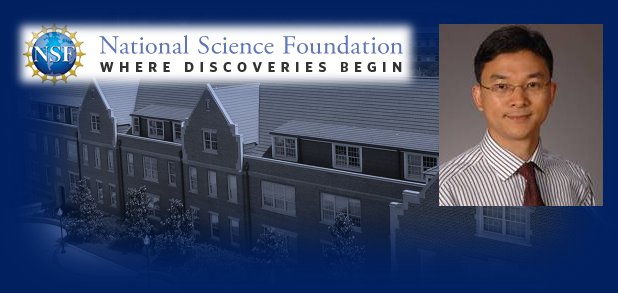ARLINGTON, VA: Dr. Guanghui (George) Lan, Assistant Professor of Industrial and Systems Engineering, has won the prestigious CAREER Award from the National Science Foundation (NSF) for his proposal entitled “Reduced-order Methods for Big Data Challenges in Nonlinear and Stochastic Optimization.” According to NSF, “The Faculty Early Career Development (CAREER) Program is a Foundation-wide activity that offers the National Science Foundation’s most prestigious awards in support of junior faculty who exemplify the role of teacher-scholars through outstanding research, excellent education and the integration of education and research within the context of the mission of their organizations.”
According to data published on the NSF website , the objective of this research “is to develop a set of new reduced-order algorithms to tackle the big-data challenges in optimization. The last several years have seen an unprecedented growth in the amount of available data. While nonlinear, especially convex programming (CP) models are important to extract useful knowledge from raw data, high problem dimensionality, large data volumes and inherent uncertainty present significant challenges to the design of optimization algorithms. This research aims to attack these challenges by investigating: (i) novel first-order methods for deterministic CP that converge faster, require little structural information and do not rely on line search, based on level methods; (ii) stochastic first-order methods that handle data uncertainty in an optimal manner, based on stochastic approximation; (iii) novel randomization schemes for solving certain challenging deterministic CP problems beyond the capability of first-order methods; and (iv) stochastic first- and zeroth-order methods for general, not necessarily convex, stochastic programs. The research focuses on two fundamental issues across these topics: (i) the study of complexity which provides guarantees on algorithmic performance; and (ii) the exploitation of structures that leads to the design of algorithms with stronger complexity and superior practical performance.”
, the objective of this research “is to develop a set of new reduced-order algorithms to tackle the big-data challenges in optimization. The last several years have seen an unprecedented growth in the amount of available data. While nonlinear, especially convex programming (CP) models are important to extract useful knowledge from raw data, high problem dimensionality, large data volumes and inherent uncertainty present significant challenges to the design of optimization algorithms. This research aims to attack these challenges by investigating: (i) novel first-order methods for deterministic CP that converge faster, require little structural information and do not rely on line search, based on level methods; (ii) stochastic first-order methods that handle data uncertainty in an optimal manner, based on stochastic approximation; (iii) novel randomization schemes for solving certain challenging deterministic CP problems beyond the capability of first-order methods; and (iv) stochastic first- and zeroth-order methods for general, not necessarily convex, stochastic programs. The research focuses on two fundamental issues across these topics: (i) the study of complexity which provides guarantees on algorithmic performance; and (ii) the exploitation of structures that leads to the design of algorithms with stronger complexity and superior practical performance.”
The research will lead to advances in healthcare through more accurate medical image reconstruction and classification. Applications also include seismology and analyzing data collected on earthquakes at stations throughout the world. The project will also develop new solvers for nonlinear optimization problems.
